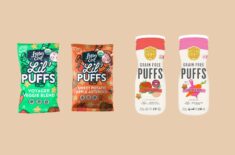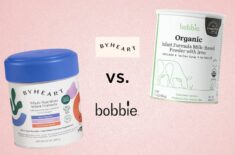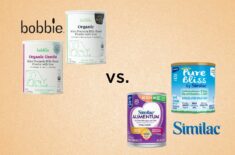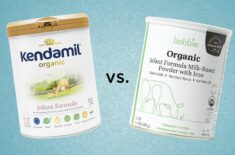Overview
Carrots are one of the first foods you think of when introducing a baby to solid foods.
But why, exactly, are carrots a great first food for babies?
Carrots of all colors (orange, yellow, red, purple, white) are easy to prepare, nutritious, and available all year round. Carrots are also one of the sweetest among all vegetables, and they are easy for babies to swallow and digest. (1)
In this article, we’ll talk about carrots’ nutrition and health benefits, food safety risks, and discuss ways to serve this nutritious vegetable for young children and older babies.
What’s BLW?
Dr. Gill Rapley, an acknowledged pioneer of BLW (baby-led weaning), defines it as a self-feeding approach where the child feeds themselves with the healthy food choices prepared for them. (2)
When Can Babies Eat Carrots?
The AAP (The American Academy of Pediatrics) states that at six months of age, most babies can begin eating solids, especially when they are showing signs of readiness for solids. This should be as a complement to breast milk or infant formula, especially for the first year of life. (3)
Health Benefits Of Serving Carrots In BLW
These versatile root vegetables are rich in the following nutrients: (4)
- Beta-carotene – Converts into vitamin A, essential for your little one’s developing eyesight, immune system, and healthy skin. (5)
- Fiber – Promotes regular bowel movements. (6)
- Calcium – Builds and maintains strong bones. (7)
- Carbohydrates – The main energy source of the body. (8)
- Choline – Supports proper liver and brain functions. (9)
- Vitamin C – For immunity. (10)
- Potassium – For proper kidney and heart function. (11)
- Magnesium – Regulates muscle and nerve functions. (12)
- Sodium – Maintains proper balance of water and minerals. (13)
- Phosphorous, thiamin, and niacin – For energy and healthy cells. (14)
Additionally, carotenoids found in carrots convert to vitamin A to support healthy eyes and vision. It also acts as an antioxidant that may help prevent certain types of cancer. (15)
Food Safety With Carrots
Are Carrots Choking Hazard?
Raw carrots are one of the most common choking hazards. But if you prepare carrots according to your baby’s age and follow choking prevention tips, carrots are nutrient powerhouses that are a great addition to mealtime. (16)
Are Carrots Allergen?
Earlier studies have shown that raw carrots are more likely to cause allergic reactions than cooked. However, researchers have recently found that cooked carrots and foods with carrot extract can also trigger allergic reactions. (17)
Symptoms Of Carrot Allergy
Carrot allergy is generally associated with birch pollen allergy. The most common symptoms of food allergies from carrots seem to be oral allergy syndrome, which includes itching in the throat and mouth. (18)
Food Safety Risk With Carrots
Carrots, like other plants that grow in or close to the ground like spinach, zucchini, and green beans, get contaminated with nitrates. Nitrates are chemicals found in fertilizers that react to hemoglobin and can cause a type of anemia in young children. (19)
Hemoglobin is a protein in the red blood cells responsible for the transportation of oxygen in the body.
Why Are Baby Carrots Not Good For You?
Baby carrots are said to be harmful because they are soaked in a chlorine bath. However, an Iowa State University Extension and Outreach nutrition specialist debunked this rumor saying that the chlorine-water mixture is an acceptable food safety precaution to help reduce bacteria and foodborne illnesses. (20)
Still, some parents might still choose to skip baby carrots.
Ways To Cook Carrots In BLW
How Long Should I Boil Carrots For A Baby?
When preparing baby meals, peel and slice carrots into smaller pieces. Carrots should be boiled for 15-20 minutes to get that soft, baby-friendly texture.
How Long Should I Sautée Carrots For A Baby?
Place peeled and chopped carrots in a pan, add ⅓ cup of water, cover, and cook over medium heat for 8-10 minutes. Sautée for another minute or until soft.
How Do You Steam Carrots For Babies?
To steam carrots, peel and slice them into bite-sized pieces and leave them steaming for 15-20 minutes.
How Do You Make Baby Food With Carrots Without A Steamer?
You can steam carrots using a pot or saucepan. Pour a cup of boiling water, add carrots, cover, and simmer for 15-20 minutes. Using a metal strainer or colander in place of a steamer basket is also a good idea.
Can A Baby Eat Roasted Carrots?
Yes. Roasting is an easy and healthy way to serve carrots for babies. Arrange cut carrots on a single layer of a baking sheet, allowing spaces between each piece, then roast for 20-25 minutes or until soft.
Is It OK To Microwave Carrots?
We don’t recommend microwaving food for any family member, especially not your little one. Instead, stick to the heating and cooking methods mentioned above.
What Is The Healthiest Way To Cook Carrots?
The answer is steaming, boiling, and sauteing in healthy oils like coconut oil, avocado oil, ghee, and extra virgin olive oil. Steaming and boiling increase the levels of beta carotene. If you use healthy oils like extra virgin olive oil when sauteing carrots, it increases the absorption of phytonutrients.
Additionally, cooking carrots and most veggies whole preserves all the nutrients as cutting can reduce nutrients by 25%. (21)
When Can Babies Have Raw Carrots?
You can start serving grated raw carrots starting at around nine months. Raw carrot sticks can be served starting at 12 months old when most babies have enhanced jaw strength and biting, chewing, and spitting skills.
Can Babies With No Teeth Eat Carrots?
Yes. For your baby’s first time eating solids, you can offer mash or carrot puree and grated cooked carrot. For older babies, diced cooked carrots and bite-sized carrots sticks are also soft enough to eat even without teeth.
How To Cut & Prepare Carrots According To Your Baby’s Age
How Do I Cook Carrots For My 6-Month-Old?
Peel and thoroughly cook one whole carrot until it’s easily pierced with a knife. Mash or grate the cooked carrot, then let your child pick it up with their hand or serve it in a pre-loaded spoon.
How Do I Give My 8-Month-Old Carrots?
Peel and cook one whole carrot until it’s completely soft and easily pierced with a knife, then dice it or slice it into short carrot sticks.
How Do I Give My 9-Month-Old Carrots?
At nine months of age, most babies develop their pincer grasp or the ability to hold things with the thumb and index finger. Serve cooked carrots sliced into bite-sized pieces and let them enjoy this nutritious veggie as finger food.
How To Prepare Carrots For 12+ Months Old
At this age, you can continue serving cooked carrots in bite-sized pieces or try offering raw carrot sticks. This may pose a bigger choking risk but also lets your child enhance their jaw strength and master biting and spitting large pieces of food.
Safety Considerations In BLW
As always, create a safe environment during mealtimes. It’s important to know the dos and don’ts in BLW before taking this feeding approach, and be sure to consult your baby’s pediatrician before serving solid foods to your baby.
Culinary Combinations With Carrots
Carrots are sweet and go well with numerous foods like avocado, coconut, egg, cheese, yogurt, nuts, legumes, beet, cabbage, peas, beans, lemon, onion, orange, pear, apple, and potato.
Fun Food Fact: Carrot leaves are full of vitamins and nutrients and can be added to pasta, soups, or stocks. (22)
How To Choose And Store Carrots
Choose carrots that have:
- Bright color
- Feathery tops
- No cuts
- No bruises
- No soft spots
When storing carrots,
- Remove the plastic packaging to avoid the “sweating” that leads to mold formation.
- Remove the leaves as they draw moisture from the roots and dry your carrots faster.
- Remove the green stubble to avoid rotting.
- Allow the outer skin to dry out in the sun for a day before placing it in the refrigerator.
- Store in the fridge away from other fruits and vegetables.
Carrots can be stored in the refrigerator for two to three months following these guidelines.
When freezing carrots, chop, blanch for 3 minutes, drain, then freeze. Carrots can be frozen for up to 1 year, although we recommend offering your baby fresh carrots wherever possible. (22)
3 Easy Baby Food Recipes To Try
- Homemade Carrot Puree – Prepare one whole cooked carrot, half a cup of bone broth, a tablespoon of coconut oil, a tablespoon of coconut yogurt, and ground cumin. Blend until smooth and serve warm.
- Carrot Cake Smoothie – In a blender, throw in ¼ cup of coconut yogurt, ½ cup filtered water, one cooked carrot (let cool before adding), half an apple, ¼ teaspoon of cinnamon powder, then blend until smooth.
- Mango, Carrot & Apple Popsicles. Prepare homemade apple juice from one apple, peel one ripe mango, then cut it into small cubes. Peel one small carrot, then grate. Using a blender or food processor, blend well to desired consistency. Pour into popsicle molds. Freeze.
REFERENCES
:
(1) https://www.ncbi.nlm.nih.gov/books/NBK538142/
(2) http://rapleyweaning.com/assets/Defining_BLW_v2.pdf
(3) https://www.healthychildren.org/English/ages-stages/baby/feeding-nutrition/Pages/Starting-Solid-Foods.aspx
(4) https://www.nutritionvalue.org/Carrots%2C_raw_nutritional_value.html
(5) https://www.mountsinai.org/health-library/supplement/beta-carotene
(6) https://www.mayoclinic.org/healthy-lifestyle/nutrition-and-healthy-eating/in-depth/fiber/art-20043983
(7) https://ods.od.nih.gov/factsheets/Calcium-Consumer/
(8) https://www.reidhealth.org/blog/carbohydrates-101-the-benefits-of-carbohydrates#
(9) https://my.clevelandclinic.org/health/drugs/22202-choline-supplement#
(10) https://ods.od.nih.gov/factsheets/VitaminC-Consumer/
(11) https://ods.od.nih.gov/factsheets/Potassium-Consumer/
(12) https://ods.od.nih.gov/factsheets/Magnesium-Consumer/
(13) https://www.hsph.harvard.edu/nutritionsource/salt-and-sodium/#
(14) https://ods.od.nih.gov/factsheets/Phosphorus-Consumer/
(15) https://www.consumerreports.org/fruits-vegetables/are-carrots-good-for-you-a8868966758/
(16) https://www.cdc.gov/nutrition/infantandtoddlernutrition/foods-and-drinks/choking-hazards.html
(17) https://www.ecarf.org/en/cooked-carrots-can-trigger-allergies/
(18) http://www.carrotmuseum.co.uk/allergy.html
(19) https://www.nationwidechildrens.org/family-resources-education/700childrens/2014/06/homemade-baby-food-the-danger-of-nitrates#
(20) https://www.extension.iastate.edu/news/baby-cut-carrots-healthy-or-harmful
(21) https://www.cnn.com/2016/05/05/health/healthy-vegetable-cooking/index.html#
(22) http://www.carrotmuseum.co.uk/carrotstorage.html













